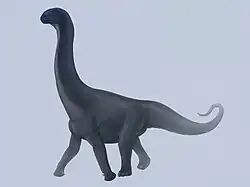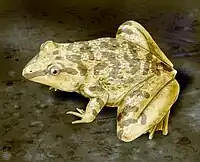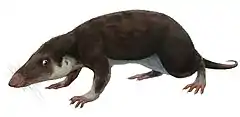Forest Marble Formation
The Forest Marble is a geological formation in England. Part of the Great Oolite Group, it dates to the late Bathonian stage of the Middle Jurassic.[1]
| Forest Marble Formation | |
|---|---|
| Stratigraphic range: Bathonian | |
 Forest Marble Formation exposed in Kirtlington Quarry, Oxfordshire | |
| Type | Geological formation |
| Unit of | Great Oolite Group |
| Underlies | Cornbrash Formation |
| Overlies | White Limestone Formation, Athelstan Oolite Formation, Chalfield Oolite Formation, Corsham Limestone Formation, Frome Clay |
| Thickness | Up to 5m thick in Buckinghamshire, 10 to 30m in Oxfordshire and Gloucestershire, 30 to about 50m in north Dorset, 30 to 75m in south Dorset |
| Lithology | |
| Primary | Mudstone, Limestone |
| Other | Siltstone, Sandstone |
| Location | |
| Region | Bedfordshire, Buckinghamshire, Oxfordshire, Dorset |
| Country | |
| Type section | |
| Named for | Wychwood Forest |
Lithology
The primary lithology of the formation typically consists of greenish grey variably calcareous silicate mudstone, with lenticular cross bedded limestone units deposited in a marine setting.[2]
Dinosaurian fauna
Ornithischians
Color key
|
Notes Uncertain or tentative taxa are in small text; |
| Ornithischians of the Forest Marble Formation | ||||||
|---|---|---|---|---|---|---|
| Genus | Species | Location | Stratigraphic position | Abundance | Notes | Images |
|
Indeterminate[3] |
|
|||||
|
Indeterminate[5] |
|
Dubious | ||||
|
Indeterminate[7] |
|
Dubious, probably indeterminate ornithischian | ||||
Saurischians
Color key
|
Notes Uncertain or tentative taxa are in small text; |
| Saurischians reported from the Forest Marble Formation | ||||||
|---|---|---|---|---|---|---|
| Genus | Species | Location | Stratigraphic position | Material | Notes | Images |
|
B. robustus[6] |
|
"Dorsal vertebra."[9] |
Reassigned to Marmarospondylus |
| ||
|
Indeterminate[4] |
|
|||||
|
C. rugulosus[6] |
|
|||||
|
C. oxoniensis |
|
|||||
|
"Cetiosaurus" |
C. glymptonensis[4] |
|
"Caudal vertebrae."[11] |
Actually indeterminate theropod remains.[12] | ||
| Dromaeosauridae[13] | Indeterminate[13] |
|
"Teeth"[13] | Remains represent three species. [13] Same species also present in the Chipping Norton Limestone. | ||
| Dorsal verebra | Dubious genus of sauropod | |||||
|
M. bucklandii[12] |
|
|||||
|
Indeterminate[15] |
Actually indeterminate theropod remains.[15] | |||||
Microvertebrate fauna
Despite the formation being nearly entirely marine, at several localities abundant remains of terrestrial microvertebrates are found, the primary locality being the Kirtlington Mammal Bed (designated 3p) in Kirtlington Quarry near Kirtlington, Oxfordshire.[17] Another important locality is Watton Cliff near Eype in Dorset.[18]
Amphibians
| Amphibians reported from the Forest Marble Formation | ||||||
|---|---|---|---|---|---|---|
| Genus | Species | Location | Stratigraphic position | Material | Notes | Images |
| Anoualerpeton | A. priscus | Kirtlington | Albanerpetontid | |||
| Eodiscoglossus | E. oxoniensis | Kirtlington | Frog, probably not closely related to type species of genus. | |||
| Marmorerpeton | M. kermacki, M. freemani | Kirtlington, Watton Cliff | Neotenic stem-group salamander (Caudata) belonging to Karauridae | |||
| Caudata | Indeterminate | Kirtlington | 2 distinct taxa, one common one small, referred to as Kirtlington Salamander A and B, respectively | |||
Turtles
| Turtles reported from the Forest Marble Formation | ||||||
|---|---|---|---|---|---|---|
| Genus | Species | Location | Stratigraphic position | Material | Notes | Images |
| Paracryptodira[19] | Indeterminate | Kirtlington | Shell fragments, basisphenoid | |||
Choristoderes
| Choristoderes reported from the Forest Marble Formation | ||||||
|---|---|---|---|---|---|---|
| Genus | Species | Location | Stratigraphic position | Material | Notes | Images |
| Cteniogenys | Indeterminate | Kirtlington | ||||
Lepidosauromorphs
| Lepidosauromorphs reported from the Forest Marble Formation | ||||||
|---|---|---|---|---|---|---|
| Genus | Species | Location | Stratigraphic position | Material | Notes | Images |
| Balnealacerta | B. silvestris | Kirtlington | Scincomorph lizard | |||
| Bellairsia | B. gracillis | Kirtlington | Squamate | 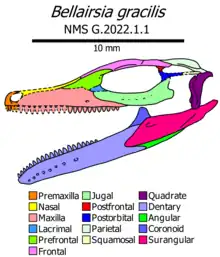 | ||
| Eophis | E. underwoodi | Kirtlington | Stem-snake | |||
| Marmoretta | M. oxoniensis | Kirtlington | Basal Lepidosauromorph | 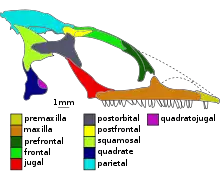 | ||
| Oxiella | O. tenuis | Kirtlington | Squamate | |||
| Parviraptor | cf. estesi | Kirtlington | Stem-snake | |||
| Saurillodon | S. marmorensis | Kirtlington | Paramacellodid lizard | |||
| Rhynchocephalia | Indeterminate | Kirtlington | ||||
Crocodyliformes
| Crocodyliformes reported from the Forest Marble Formation | ||||||
|---|---|---|---|---|---|---|
| Genus | Species | Location | Stratigraphic position | Material | Notes | Images |
| cf. Goniopholis | Indeterminate | Kirtlington | ||||
| cf. Theriosuchus | Indeterminate | Kirtlington | ||||
Mammaliamorphs
| Mammaliamorphs reported from the Forest Marble Formation | |||||||
|---|---|---|---|---|---|---|---|
| Genus | Species | Location | Stratigraphic position | Material | Notes | Images | |
| Amphitherium | Indeterminate | ?Kirtlington, Watton Cliff | The first Mesozoic mammal to be described. Initially believed to be a marsupial. Close relative of Palaeoxonodon and Peramuridae. | ||||
| Borealestes | B. serendipitus | Kirtlington, Watton Cliff | molar fragments | Docodonta | |||
| Dobunnodon | B. mussetti | Kirtlington | molar fragments | ||||
| Gobiconodon | G. bathoniensis | Kirtlington, Watton Cliff | Gobiconodontid | ||||
| Hahnotherium | H. antiquum | Kirtlington, Watton Cliff | Multituberculate | ||||
| Kermackodon | K. multicuspis, K. oxfordensis | Kirtlington, Watton Cliff | Allotherian belonging to the family Kermackodontidae, K. oxfordensis previously placed in separate genus Eleutherodon. | 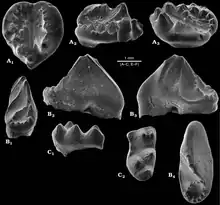 | |||
| Kirtlingtonia | K. catenata | Kirtlington | Haramiyid | ||||
| Krusatodon | K. kirtlingtonensis | Kirtlington | Tegotheriid docodontan | ||||
| Millsodon | M. superstes | Kirtlington, Watton Cliff | Haramiyid | ||||
| Morganucodon | M. tardus | Watton Cliff | Morganucodontidae | ||||
| Palaeoxonodon | P. ooliticus | Kirtlington, Watton Cliff | Amphitheriid | ||||
| Paritatodon | P. kermacki | Kirtlington | Docodontan or Shuotheriidae | ||||
| Peraiocynodon | P. major | Kirtlington | Docodontidae | ||||
| Phascolotherium | P. simpsoni | Kirtlington, Watton Cliff | Amphilestidae | ||||
| Simpsonodon | S. oxfordensis | Kirtlington | Docodonta | ||||
| Shuotherium | Indeterminate | Kirtington | Shuotheriidae | ||||
| Stereognathus | S. ooliticus | Kirtlington, Watton Cliff | Tritylodontidae | ||||
| Stylidens | S. hookeri | Watton Cliff | Morganucodontidae | ||||
| Wareolestes | W. rex | Kirtlington | Morganucodonta | ||||
| Allotheria | Indeterminate | Kirtlington | |||||
| Haramiyida | Indeterminate | Kirtlington | |||||
| Dryolestida | Indeterminate | Lower molars | |||||
| Peramuridae | Indeterminate | Watton Cliff | |||||
Footnotes
- Weishampel, David B; et al. (2004). "Dinosaur distribution (Middle Jurassic, Europe)." In: Weishampel, David B.; Dodson, Peter; and Osmólska, Halszka (eds.): The Dinosauria, 2nd, Berkeley: University of California Press. Pp. 538–541. ISBN 0-520-24209-2.
- British Geological Survey. "Forest Marble Formation". BGS Lexicon of Named Rock Units. Retrieved 1 November 2018.
- Listed as "cf. Alocodon sp." in "10.11 Oxfordshire, England; 6. Forest Marble Formation," in Weishampel, et al. (2004). Page 540.
- "10.11 Oxfordshire, England; 6. Forest Marble Formation," in Weishampel, et al. (2004). Page 540.
- Listed as "?Hylaeosaurus sp." in "10.13 Wiltshire, England; 3. Forest Marble Formation," in Weishampel, et al. (2004). Page 540.
- "10.13 Wiltshire, England; 3. Forest Marble Formation," in Weishampel, et al. (2004). Page 540.
- Listed as "?Iguanodon sp." in "10.11 Oxfordshire, England; 6. Forest Marble Formation," in Weishampel, et al. (2004). Page 540.
- "10.11 Oxfordshire, England; 6. Forest Marble Formation" and "10.13 Wiltshire, England; 3. Forest Marble Formation," in Weishampel, et al. (2004). Page 540.
- "Table 13.1," in Weishampel, et al. (2004). Page 270.
- "10.11 Oxfordshire, England; 6. Forest Marble Formation," in Weishampel, et al. (2004). Page 538, 540.
- "Table 13.1," in Weishampel, et al. (2004). Page 265.
- "10.3 Gloucestershire, England; 4. Forest Marble Formation," in Weishampel, et al. (2004). Page 538.
- Wills, S.; Underwood, C. J.; Barrett, P. M. (2023). "Machine learning confirms new records of maniraptoran theropods in Middle Jurassic UK microvertebrate faunas". Papers in Palaeontology. 9 (2). e1487. doi:10.1002/spp2.1487.
- Weishampel, et al. (2004). Pages 539-540.
- "10.7 Dorset, England; 2. Forest Marble Formation" and "10.11 Oxfordshire, England; 6. Forest Marble Formation," in Weishampel, et al. (2004). Pages 539-540.
- "10.7 Dorset, England; 2. Forest Marble Formation," in Weishampel, et al. (2004). Page 539.
- "Kirtlington 3p (Mammal Bed)". Paleobiology Database. Retrieved 28 August 2018.
- "Watton Cliff (West Cliff), Dorset". Paleobiology Database. Retrieved 28 August 2018.
- SCHEYER, TORSTEN M.; ANQUETIN, JÉRÉMY (March 2008). "Bone histology of the Middle Jurassic turtle shell remains from Kirtlington, Oxfordshire, England". Lethaia. 41 (1): 85–96. doi:10.1111/j.1502-3931.2007.00044.x. ISSN 0024-1164.
References
- Weishampel, David B.; Dodson, Peter; and Osmólska, Halszka (eds.): The Dinosauria, 2nd, Berkeley: University of California Press. 861 pp. ISBN 0-520-24209-2.
